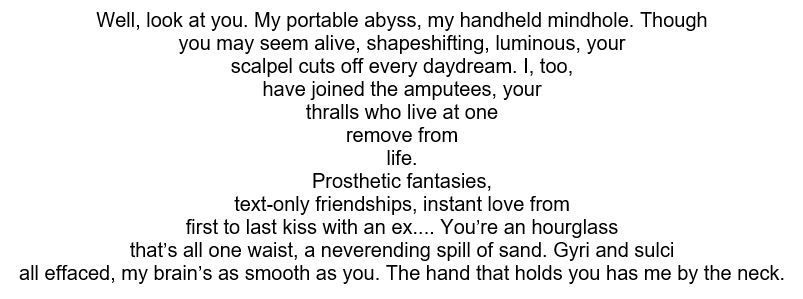
John Talbot
Envieth Not
Epitaph of Menophilos
Such days as were my lot I passed in joy
Buoyed in the quickening flux of poetry.
Bacchus was never very far away,
Or Aphrodite either. As to friends:
Not one of them can tell of an offense
I ever did them. I am Menophilos,
A son of Asia, till I left to settle
Far from home in the sundown hills of Italy.
Here I held my ground, and now am held
Among the dead. I never did grow old.
Some spirit must have whispered: Pay
A visit to an obsolete
Old woman. Let young smiles defeat
The tedium of her vacant day,
And let her marvel that with all
The pressures of their wedding soon
Approaching, they found time to loan
An hour to housebound her. She’ll tell
Her friends (those that survive) how wrong
It would have been to criticize
Young people for their modern ways.
They made her, for that hour, belong
Once more to the panache of youth.
The zest of her grand-nephew groom,
The bride’s high spirits, warmed the room.
– All this she told me. But the truth,
I’m pretty sure, is otherwise.
My guess is that his mother meant
To gratify a maiden aunt
And ordered them to compromise.
So off they went, the groom and bride,
And paid their due respects – but watched
The time, and when the slow hand touched
The twelve, they deemed that they’d complied,
And showered their polite regrets,
And left the tall clock in the hall
To keep her company, and toll
The barren afternoon. And yet
I do not pity her. A please,
A thanks, a grudging niece who brings
A birthday card – those little things
That I’d call bare civilities –
Her heart mistranslates into love
And gallantry. Each caller leaves
Endowed with virtue she perceives
Gone out of them they didn’t have.
Her cup runs over with such strong
Mistaken gratitude. So say
She’s blind to bitter truth. You may
Be right, but you’d be in the wrong.
John Talbot’s poems have appeared in
Poetry, The Yale Review, The New Criterion, The Spectator, The Dark Horse, First Things, The American Scholar, New Verse Review, and many others, as well as in anthologies from W. W. Norton, Yale University Press, and Waywiser. He has published two volumes of poems and many articles, reviews, chapters, and books on English, Greek, and Latin literature—most recently a volume on C. H. Sisson, co-edited with the scholar and poet Victoria Moul.
